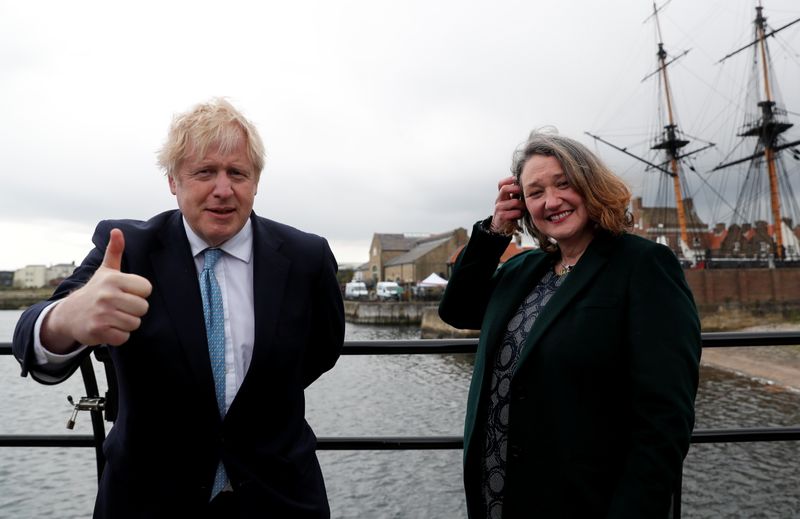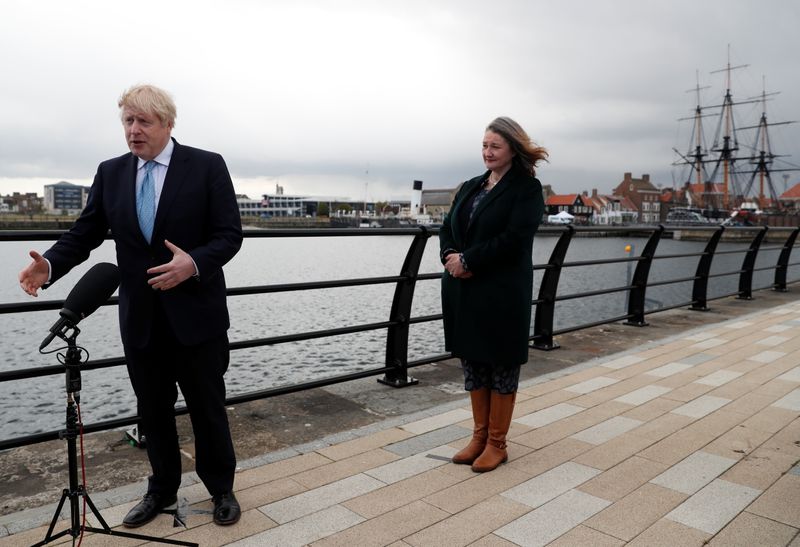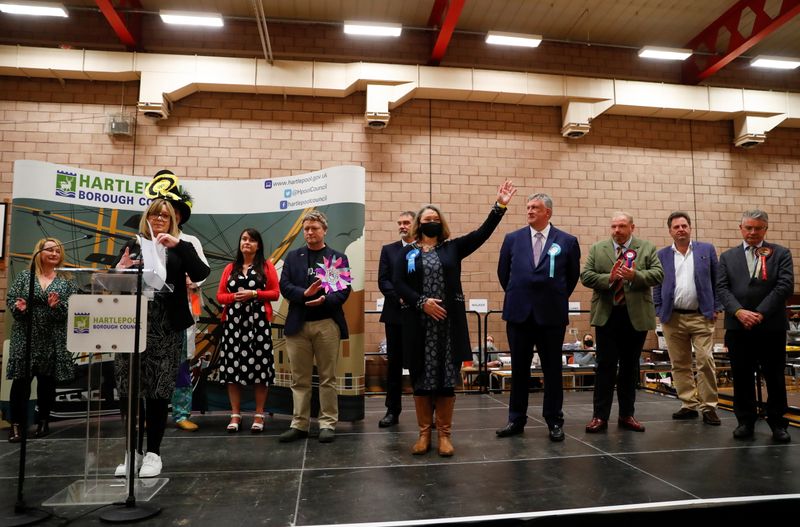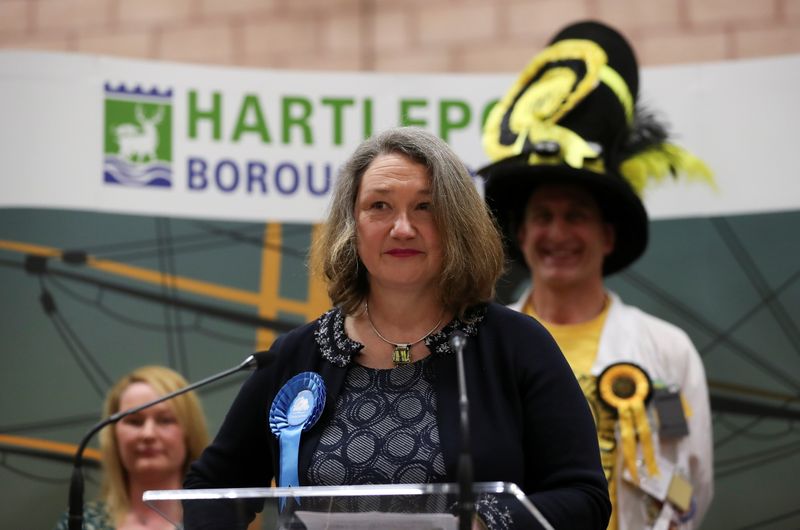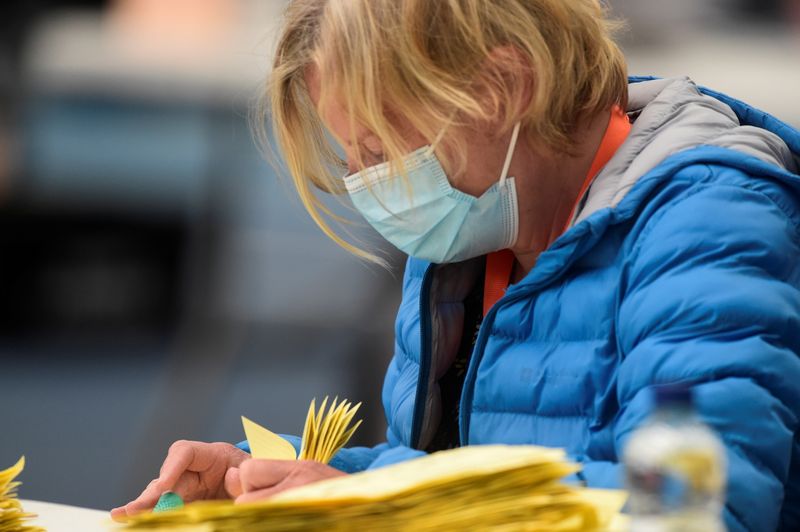LONDON (Reuters) -Voters in an opposition stronghold turned en masse to British Prime Minister Boris Johnson’s Conservatives, boosting his parliamentary majority on Friday despite a high COVID-19 death toll, last year’s record economic slump and cronyism charges.
Conservative Jill Mortimer beat Labour’s candidate in Thursday’s ballot by 15,529 votes to 8,589 to take the parliamentary seat for Hartlepool, a victory once unthinkable in a northeastern English port town that for decades backed Britain’s main opposition party.
The overwhelming victory for an often-criticised governing party increases pressure on Labour leader Keir Starmer, who has struggled to revive his party’s fortunes since a disastrous national election in 2019.
Johnson celebrated by immediately visiting Hartlepool where he ascribed his party’s success to its policies of delivering Brexit and ploughing money into areas where many voters have felt neglected by successive London-based governments.
“I think what this election shows is that people want a party and a government that is focused on them, focused on delivering change,” he told reporters, standing in front of a giant inflatable version of himself.
“I think what’s happened now is they can see that we did get Brexit done and to a certain extent they can see that we delivered on that. And I think what people want us to do now is to get on with delivering with everything else.”
Starmer expressed his dismay at the result, pledging to do whatever it takes to reconnect to voters.
“I am bitterly disappointed in the results and I take full responsibility for the result and I will take full responsibility for fixing things,” he told reporters.
“We have changed as a party but we haven’t set out a strong enough case to the country. Very often we have been talking to ourselves instead of to the country and we’ve lost the trust of working people, particularly in places like Hartlepool. I intend to do whatever is necessary to fix that.”
Voters on Thursday also elected local councils and parliaments in Scotland and Wales, in Scotland’s case also gauging support for the depth of backing for its leading party’s push for independence.
Early results in Scotland left uncertainty over whether the Scottish National Party would win a crucial majority. In Wales, results so far showed Labour holding its ground.
The Hartlepool by-election, which took place outside the normal parliamentary cycle, was triggered by the resignation of a Labour lawmaker in March.
Election analysts said it was the biggest swing of votes to the governing party at a by-election since World War Two. The outcome wrong-footed critics who have taken aim at the prime minister over sleaze allegations and for failing to move quickly enough to tackle the coronavirus crisis. Britain has one of the world’s highest COVID-19 death tolls.
“It’s quite a spectacular turnaround in a seat that Labour should really have saved and defended,” politics professor Michael Thrasher told Sky News.
RED WALL
Early results from the other elections, which will be released over several days because COVID-19 restrictions have slowed the counts, indicated the Conservatives had also gained seats on English councils, which look after local services.
The Hartlepool result continues a trend set by Johnson in the 2019 parliamentary election when he struck directly at Labour’s heartlands, the “Red Wall” areas of northern and central England, to score a commanding majority in parliament on a simple message to “get Brexit done”.
Labour had tried to manage expectations over the vote, saying that Thursday’s elections would always be difficult at a time of the coronavirus pandemic, which has boosted support for the government because of its rapid vaccine rollout.
Starmer, who was elected leader last year, has tried to shift Labour towards the centre ground after two defeats under Jeremy Corbyn’s leftist leadership, but has struggled to bridge the divides and unite Labour around a clear agenda.
Labour lawmakers were quick to portray the loss as a hangover from the 2019 national election, when the party suffered one of its worst results, and some pointed the finger at Corbyn – something one of his allies called “a loser’s line”.
“I feel … pretty angry because I think we could have seen this coming some time ago, indeed years ago. Since Labour left office in 2010 we haven’t played it well,” said Peter Mandelson, who was the Labour lawmaker for Hartlepool from 1992 and 2004 and a minister under former prime minister Tony Blair.
But Labour lawmaker Khalid Mahmood said the party had been captured by “a London-based bourgeoisie, with the support of brigades of woke social media warriors.”
(Reporting by Elizabeth Piper and William James, additional reporting by Paul Sandle, Sarah Young, Alistair Smout and Michael Holden; editing by Mark Heinrich and Alistair Bell)

